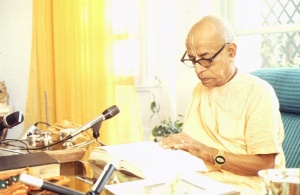SB 4.2.13

A.C. Bhaktivedanta Swami Prabhupada
TEXT 13
- lupta-kriyāyāśucaye
- mānine bhinna-setave
- anicchann apy adāṁ bālāṁ
- śūdrāyevośatīṁ giram
SYNONYMS
lupta-kriyāya — not observing rules and regulations; aśucaye — impure; mānine — proud; bhinna-setave — having broken all rules of civility; anicchan — not desiring; api — although; adām — handed over; bālām — my daughter; śūdrāya — unto a śūdra; iva — as; uśatīm giram — the message of the Vedas.
TRANSLATION
I had no desire to give my daughter to this person, who has broken all rules of civility. Because of not observing the required rules and regulations, he is impure, but I was obliged to hand over my daughter to him just as one teaches the messages of the Vedas to a śūdra.
PURPORT
A śūdra is forbidden to take lessons from the Vedas because a śūdra, due to his unclean habits, is not worthy to hear such instructions. This restriction, that unless one has acquired the brahminical qualifications one should not read the Vedic literatures, is like the restriction that a law student should not enter a law college unless he has been graduated from all lower grades. According to the estimation of Dakṣa, Śiva was unclean in habits and not worthy to have the hand of his daughter, Sati, who was so enlightened, beautiful and chaste. The word used in this connection is bhinna-setave, which refers to one who has broken all the regulations for good behavior by not following the Vedic principles. In other words, according to Dakṣa the entire transaction of the marriage of his daughter with Śiva was not in order.